




|
|
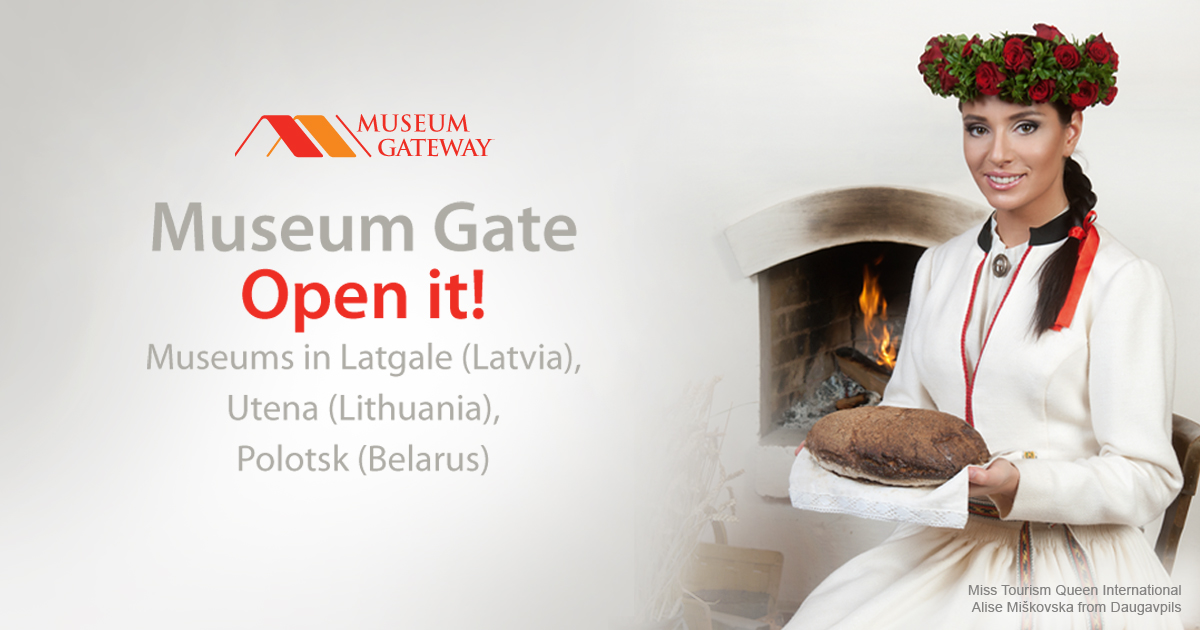 |
|
| |
|
Latgale Planning Region invites you to open gates of museums in Latgale, Polotsk, and Utena and to learn about values of cultural and historical heritage carefully maintained by border-region museums of all three countries! Museums is the exact place that invites us not only to learn the history of one’s country, study one’s own roots and identity, but also to get acquainted with one’s neighbours! Rugāji District Museum 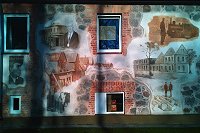 Rugāji District Museum offers expositions on the most remarkable people of the district, teachers and graduates of Rugāji secondary school, 20th century household objects, tools, and national costumes made by A. Ivanāne, living in the same district. The museum organizes various events and creates thematic exhibitions, as well as offers tours around Rugāji village. The museum is also supervising memorial sites of the district: the Square with the memorial stone to deportees, the Partisan memorial stone near the museum, the Warrior's cemetery of the soldiers killed during the Second World War, the memorial stone to T. Matīss, who lived in the surroundings of Rugāji, in the Rugāji Park. Rugāji District Museum offers expositions on the most remarkable people of the district, teachers and graduates of Rugāji secondary school, 20th century household objects, tools, and national costumes made by A. Ivanāne, living in the same district. The museum organizes various events and creates thematic exhibitions, as well as offers tours around Rugāji village. The museum is also supervising memorial sites of the district: the Square with the memorial stone to deportees, the Partisan memorial stone near the museum, the Warrior's cemetery of the soldiers killed during the Second World War, the memorial stone to T. Matīss, who lived in the surroundings of Rugāji, in the Rugāji Park. Open: Monday to Friday: 09:00-17:00. Address: Kurmenes Street 87, Rugāji, Rugāju district, Latvia +371 25623315, [email protected], [email protected] Balvi District Museum 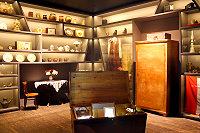 In 2010 the museum moved to a new place – the reconstructed manor granary. Here history is mixed with new trends – the cellar vaults built by manor people stand together with the new roof window of the exhibition hall, old granary door made from 200-year old timber and furniture made by local masters, exhibitions portraying the olden times of the district and the life vision of young artists. At the end of September 2014, a new and up-to-date exposition was opened: "Nonmaterial Cultural Heritage of Northern Latgale". Five exposition halls of the museum show themes characteristic to the Northern Latgale, namely, ethnography, traditional music, folklore, customs, psalms, May chants, skills of people, and other local values. The museum offers educational programmes and tours around the manor and the town (please, notify us on your visit in advance). The museum welcomes also people with special needs. In 2010 the museum moved to a new place – the reconstructed manor granary. Here history is mixed with new trends – the cellar vaults built by manor people stand together with the new roof window of the exhibition hall, old granary door made from 200-year old timber and furniture made by local masters, exhibitions portraying the olden times of the district and the life vision of young artists. At the end of September 2014, a new and up-to-date exposition was opened: "Nonmaterial Cultural Heritage of Northern Latgale". Five exposition halls of the museum show themes characteristic to the Northern Latgale, namely, ethnography, traditional music, folklore, customs, psalms, May chants, skills of people, and other local values. The museum offers educational programmes and tours around the manor and the town (please, notify us on your visit in advance). The museum welcomes also people with special needs.Unique exhibits: National costume of Abrene This replica costume set was made in 2011 – 2013 according to the 19th century originals available in the collection of the National History Museum of Latvia. The costume was made by a group of authors under the guidance of Iveta Gabrāne (1974) within the framework of the project "Abrene National Costume Revival Workshops". Awards of the General Valdis Matīss Photos, documents, General's festive and everyday uniforms, and awards of Valdis Matīss – the General of ground troops brigade, the head of the reinstated National Defence Academy, and Latvia's military attaché to the USA, Canada, and Russia, Valdis Matīss being a man from the same district. Collection of traditional folk music instruments, the most unique of which is a contrabass or a bass balalaika. Ceramic collection by applied arts masters Jolanta and Valdis Dundenieks Open: Tuesday to Friday: 10:00-17:00, on Saturdays: 11:00-16:00. Address: Brīvības Street 46, Balvi, Latvia +371 64521430, +371 28352770, [email protected], www.balvi.lv, www.muzejs.balvi.lv Viļaka District Museum of Cultural History "Vēršukalns" (Bull hill) 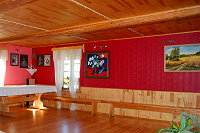 If you want to forger everyday rush and stress, try some true home-made butter, jam with fresh-baked white bread, black pudding, soup as eaten in countryside, look deep into the hearts of the people from Susāji parish, participate in traditional events and Latvian national festivities – and do it in well-maintained rural environment, then come and visit us! We offer both individual tours and tours for groups of up to 40 people. If you want to forger everyday rush and stress, try some true home-made butter, jam with fresh-baked white bread, black pudding, soup as eaten in countryside, look deep into the hearts of the people from Susāji parish, participate in traditional events and Latvian national festivities – and do it in well-maintained rural environment, then come and visit us! We offer both individual tours and tours for groups of up to 40 people.Unique exhibits: Textiles and ceramics by masters from Susāji parish. Open: Monday to Friday: 8:30-17:00, and by request Address: Svilpova, Susāju parish, Viļaka district, Latvia +371 29243878, [email protected] Viļaka District Museum 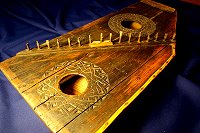 The museum discloses the history of Viļaka town and its vicinity from the 13th century till nowadays. The "White room" of the museum tells about the history of the district's Christian parishes – Catholics, Orthodox, and Lutherans. The memorial room devoted to Catholic bishops Kazimirs Duļbinskis and Valerians Zondaks shows bishops' ceremony and personal belongings. The museums offers an opportunity to look at a phillumeny collection (phillumeny – collecting of matchboxes) gathered by Jānis Laicāns (1500 units). The museum exhibition hall invites to visit an exhibition of paintings by Jānis Laicāns and Anna Laicāne. The museum organizes various events, thematic exhibitions, as well as educational programmes. We also offer tours around the town. The museum discloses the history of Viļaka town and its vicinity from the 13th century till nowadays. The "White room" of the museum tells about the history of the district's Christian parishes – Catholics, Orthodox, and Lutherans. The memorial room devoted to Catholic bishops Kazimirs Duļbinskis and Valerians Zondaks shows bishops' ceremony and personal belongings. The museums offers an opportunity to look at a phillumeny collection (phillumeny – collecting of matchboxes) gathered by Jānis Laicāns (1500 units). The museum exhibition hall invites to visit an exhibition of paintings by Jānis Laicāns and Anna Laicāne. The museum organizes various events, thematic exhibitions, as well as educational programmes. We also offer tours around the town. Unique exhibits: Hectograph (an apparatus for copying documents; 1970s) – hand-made by priest Oļģerts Aleksāns Altar chest taken by bishop Kazimirs Duļbinskis to his exile Stole Phillumeny collection Oil vessels (pottery) Kokle (Latvian national musical instrument similar to the harp/zither) and zither-kokle (30s – 40s of the 20th century) Open: May 1 – October 31: Tuesday to Thursday: 9:00-17:00, on Fridays: 9:00-18:00, on Saturdays: 9:00-16:00, November 1 – April 30: Monday to Friday: 9:00-17:00 Address: Balvu Street 13, Viļaka, Viļaka district, Latvia +371 64563302, [email protected] Ontons Slišāns Museum of Cultural History of Upīte 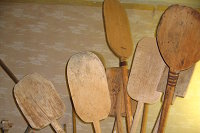 Ontons Slišāns Museum of Cultural History of Upīte, Upīte people's house and Upīte library are situated in one building and together form Upīte Centre of nonmaterial culture. That is why one of the main directions of the museum activities is to gather, preserve, study and popularize nonmaterial cultural heritage. Museum collections hold audios with women singings from 1970s. The museum offers workshops of traditional handicraft: weaving in large weaver's loom, weaving of Northern Latgalian belts, weaving of straw hats, macramé, and pipe-making. This place hosts the oldest Latgalian festival "Upītes Uobeļduorzs" (Apple Orchard of Upīte) devoted to Latgalian spiritual values. Ontons Slišāns Museum of Cultural History of Upīte, Upīte people's house and Upīte library are situated in one building and together form Upīte Centre of nonmaterial culture. That is why one of the main directions of the museum activities is to gather, preserve, study and popularize nonmaterial cultural heritage. Museum collections hold audios with women singings from 1970s. The museum offers workshops of traditional handicraft: weaving in large weaver's loom, weaving of Northern Latgalian belts, weaving of straw hats, macramé, and pipe-making. This place hosts the oldest Latgalian festival "Upītes Uobeļduorzs" (Apple Orchard of Upīte) devoted to Latgalian spiritual values. Unique exhibits: Stone anchor found on the bank of the River Kūkova Great collection of bread-shovels from Upīte surroundings Audio records of 1970s with spiritual songs and folk songs Herdsmen horns from grey alder peels Collection of bread-shovels All books written by Ontons Slišāns Open: on Fridays: 11:00-16:00, on Saturdays: 11:00-16:00, other time – with prior notification Address: Akas Square 1, Upīte, Šķilbēnu parish, Viļaka district, Latvia +371 29868786, [email protected], www.vilaka.lv Baltinava District Museum 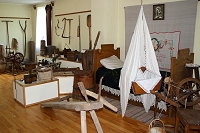 Museum visitors have an opportunity to learn about the history of the Baltinava district from the 17th century till modern days. Everyone can visit expositions revealing the history of the district and its ethnography, the most notable people living in the Baltinava surroundings, the 20th century household objects and tools. The museum hosts exhibitions where both art school students and artists from this district present their works. The museum offers lectures and thematic events, as well as tours around tourism objects of the Baltinava district (tours should be notified in advance). Museum visitors have an opportunity to learn about the history of the Baltinava district from the 17th century till modern days. Everyone can visit expositions revealing the history of the district and its ethnography, the most notable people living in the Baltinava surroundings, the 20th century household objects and tools. The museum hosts exhibitions where both art school students and artists from this district present their works. The museum offers lectures and thematic events, as well as tours around tourism objects of the Baltinava district (tours should be notified in advance). Unique exhibits: Weaved towels, embroidered black bedcovers from the 19th – 20th centuries Prayer books in the Latgalian language from the 18th – 19th centuries 1908–1909 Latgalian newspaper "Drywa" (Crop Field) Open: Monday to Friday: 10:00-16:00. Other visiting times are possible with prior notification. Address: Tilžas Street 7, Baltinava, Baltinava district, Latvia +371 29341738, [email protected], www.baltinava.lv Ludza Museum of Local Lore 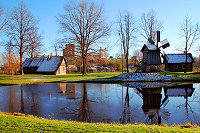 This is one of the oldest museums in Latgale that collects, preserves and studies historical testimonies of Ludza. Just recently the museum has celebrated its 95th anniversary. Since 1956 the museum is situated in the hereditary house of Yakov Kulnev (orig. Яков Петрович Кульнев), a hero of the war of 1812. One of the permanent museum expositions is devoted to the legendary Major General Yakov Kulnev. Artefacts found during archaeological excavations in Odukalns (Mosquito Hill) ancient burial site at the end of the 19th century can be seen in the museum exposition "Ancient Latgallians". The exposition "Medieval Times in Ludza District" offers an opportunity to try on a role of a castle hostess as well as to try out weaving of ancient linen in vertical ancient loom. In the Medieval forging workshop museum guests can forge a coin with symbols of the museum and of Ludza. The Open-air and Ethnography exposition of the museum shows rural buildings that characterize main rural building traditions of the Ludza district in the turn of the 19th – 20th centuries. The picturesque natural landscapes of Latgale can be seen in the Nature exposition of the museum, this exhibition shows the diversity of the district's flora and fauna. The museum offers tours around the very museum as well as in the historical centre of the town. The museum welcomes newly married couples to make their wedding day unforgettable and to participate in the programme "Winding Road of Newlyweds' Life in Ludza Museum". This is one of the oldest museums in Latgale that collects, preserves and studies historical testimonies of Ludza. Just recently the museum has celebrated its 95th anniversary. Since 1956 the museum is situated in the hereditary house of Yakov Kulnev (orig. Яков Петрович Кульнев), a hero of the war of 1812. One of the permanent museum expositions is devoted to the legendary Major General Yakov Kulnev. Artefacts found during archaeological excavations in Odukalns (Mosquito Hill) ancient burial site at the end of the 19th century can be seen in the museum exposition "Ancient Latgallians". The exposition "Medieval Times in Ludza District" offers an opportunity to try on a role of a castle hostess as well as to try out weaving of ancient linen in vertical ancient loom. In the Medieval forging workshop museum guests can forge a coin with symbols of the museum and of Ludza. The Open-air and Ethnography exposition of the museum shows rural buildings that characterize main rural building traditions of the Ludza district in the turn of the 19th – 20th centuries. The picturesque natural landscapes of Latgale can be seen in the Nature exposition of the museum, this exhibition shows the diversity of the district's flora and fauna. The museum offers tours around the very museum as well as in the historical centre of the town. The museum welcomes newly married couples to make their wedding day unforgettable and to participate in the programme "Winding Road of Newlyweds' Life in Ludza Museum".Unique exhibits: Archaeological collection that includes fishing tools (dated 3000 BCE), an owl fibula (7th – 9th centuries), a zoomorphic pendant – a horse (11th – 13th centuries), jewelleries of ancient Latgallians, burial equipment, and tools. Building objects of the Open-air and Ethnography exhibition: "Chimney-less Log" and "P. Vilcāns' Pottery Studio". Open: Monday to Friday: 8:00-17:00, on Saturdays: 10:00-17:00 (April 1 – November 1), 10:00-15:00 (November 1 – April 1) Address: J. Kuļņeva Street 2, Ludza, Latvia, +371 65723931, www.ludzasmuzejs.lv Museum of Writer Antons Rupainis 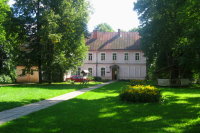 The museum was founded in 1988. Since 2005 it is named after Latgalian writer Antons Rupainis. The museum collection stores materials related to the life and creative work of the poet. The poet is born in Pūriski of Bērzgale parish, has attended Bērzgale school, Rēzekne Pedagogical Institute and further obtained school-teacher's education. He has written poetry, drama, and novels on the history of Latgale. In 1944 he migrated to Germany, in 1948 he moved to Minnesota (USA). The museum possesses materials on 12 Rupainis' contemporaries born at the end of the 19th or the beginning of the 20th centuries, who lived in the Bērzgale parish and lead active social life. Besides that, the museum collection presents materials on the history of the Bērzgale parish, on German-origin landlords Manteufels, and on Polish-origin landlords – the Veitko family. The museum was founded in 1988. Since 2005 it is named after Latgalian writer Antons Rupainis. The museum collection stores materials related to the life and creative work of the poet. The poet is born in Pūriski of Bērzgale parish, has attended Bērzgale school, Rēzekne Pedagogical Institute and further obtained school-teacher's education. He has written poetry, drama, and novels on the history of Latgale. In 1944 he migrated to Germany, in 1948 he moved to Minnesota (USA). The museum possesses materials on 12 Rupainis' contemporaries born at the end of the 19th or the beginning of the 20th centuries, who lived in the Bērzgale parish and lead active social life. Besides that, the museum collection presents materials on the history of the Bērzgale parish, on German-origin landlords Manteufels, and on Polish-origin landlords – the Veitko family. Unique exhibits: personal belongings of Antons Rupainis, manuscripts and books Open: Monday to Friday: 8:00-16:30. Other visiting times are possible with prior notification. Address: Rītupes Street, Bērzgale, Bērzgale parish, Rēzekne district, Latvia +371 26191623 Latgale Culture and History Museum 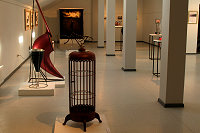 The museum is a meeting place of different generations. It is a place to receive positive emotions. The museum offers to receive better knowledge on the town's history, to delight in various art exhibitions and to participate in creative activities. The Latgale Ceramics exposition not only allows to see the development of pottery from its dawn in Neolith till modern days, but also to touch, hear, and feel clay transformation. Students and pupils can learn history subjects during exciting museum lessons, while curious little birthday boys and girls are invited to celebrate their birthdays in the museum. The museum offers also services of a reading hall. The museum is a meeting place of different generations. It is a place to receive positive emotions. The museum offers to receive better knowledge on the town's history, to delight in various art exhibitions and to participate in creative activities. The Latgale Ceramics exposition not only allows to see the development of pottery from its dawn in Neolith till modern days, but also to touch, hear, and feel clay transformation. Students and pupils can learn history subjects during exciting museum lessons, while curious little birthday boys and girls are invited to celebrate their birthdays in the museum. The museum offers also services of a reading hall. Unique exhibits: a scull of a wild ox (aurochs), Livonian-time hoard (15th – 16th centuries), 18th – 19th century prayer book in the Latgalian language, the first Latgalian newspaper "Gaisma" ("Light"), a set of a field surgeon tools from the First World War period, a console mirror belonging to the family of the famous Finnish film director of Latgalian origin Teuvo Tulio, furniture and equipment of a beauty parlour from the first independent Latvia times (1920s – 1930s), a camera "Exacta" belonging to the Latvian photography legend Jānis Gleizds. Open: Tuesday to Friday: 10:00-17:00; on Saturdays: 10:00-16:00; Sunday to Monday: closed; Summer: Wednesday to Friday: 11:00-18:00; Saturday and Sunday: 10:00-16:00; Monday to Tuesday: closed Address: Atbrīvošanas Alley 102, Rēzekne, Latvia +371 64622464, [email protected], [email protected], www.rezekne.lv, www.muzeji.lv Francis Trasuns Museum "Kolnasāta" (Hill Farmstead) 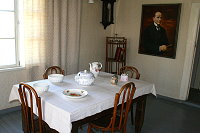 Francis Trasuns Museum "Kolnasāta" is devoted to the Latgalian cultural and public figure, statesman and clergyman Francis Trasuns. "Kolnasāta" is the family house of Trasuns. Visitors can see around the main expositions of the museum: "Life and Activities of F. Trasuns", "Jānis Klīdzējs from Sakstagals till California"; the permanent collection exhibition "Ancient Household Objects" situated in a granary. The museum has developed such educational programmes as "Ancient Household Objects", "An Angel for Everyone", "F. Trasuns' Fables", "Wedding in Latgale". In its territory, the museum offers a bonfire place, a swing, a shed with seats as well as complex history expeditions and training placements for students, halls for conferences, seminars and meetings (150 seats), a room with a fireplace and a modern exhibition hall. Francis Trasuns Museum "Kolnasāta" is devoted to the Latgalian cultural and public figure, statesman and clergyman Francis Trasuns. "Kolnasāta" is the family house of Trasuns. Visitors can see around the main expositions of the museum: "Life and Activities of F. Trasuns", "Jānis Klīdzējs from Sakstagals till California"; the permanent collection exhibition "Ancient Household Objects" situated in a granary. The museum has developed such educational programmes as "Ancient Household Objects", "An Angel for Everyone", "F. Trasuns' Fables", "Wedding in Latgale". In its territory, the museum offers a bonfire place, a swing, a shed with seats as well as complex history expeditions and training placements for students, halls for conferences, seminars and meetings (150 seats), a room with a fireplace and a modern exhibition hall. Unique exhibits: plates and dishes of the Trasuns family, a gramophone that is still working, a 19th century dower chest, and Latgalian shoulder shawls. Open: Monday to Friday: 8:00-16:30, on Saturdays and Sundays: with prior notification Address: Kalna Street 3, Sakstagala parish, Rēzekne district, Latvia, +371 64640594, +371 26248270, +371 26338798, [email protected] Viļāni Museum of Local Lore 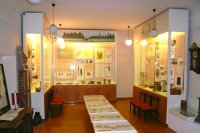 The permanent exposition of the museum provides fascinating insight into particular history spans of Viļāni town and Viļāni district as well as into daily activities of its inhabitants and creates memorable mood and opportunity to feel the breath of that period of time. Since the museum collection was gathered by tens of pupils as well as by town and district inhabitants who have kindly presented various objects used by their ancestors, the museum collection is varied and saturated with memories on culture, customs, and social life of Viļāni district inhabitants. The museum offers the tour "Viļāni Historical Path" that will help to walk around the most remarkable historical and cultural places of the town. The museum's exhibition hall is constantly showing art and handicraft pieces of both local people and guests form more distant places, as well as thematic exhibitions made by the very museum workers. The permanent exposition of the museum provides fascinating insight into particular history spans of Viļāni town and Viļāni district as well as into daily activities of its inhabitants and creates memorable mood and opportunity to feel the breath of that period of time. Since the museum collection was gathered by tens of pupils as well as by town and district inhabitants who have kindly presented various objects used by their ancestors, the museum collection is varied and saturated with memories on culture, customs, and social life of Viļāni district inhabitants. The museum offers the tour "Viļāni Historical Path" that will help to walk around the most remarkable historical and cultural places of the town. The museum's exhibition hall is constantly showing art and handicraft pieces of both local people and guests form more distant places, as well as thematic exhibitions made by the very museum workers.Unique exhibits: a mammoth tooth Open: Monday to Friday: 8:00-12:00, 13:00-17:00, groups with prior notification – also during holidays Address: Kultūras Square 2, Viļāni, Viļāni district, Latvia, +371 26476570, [email protected] Malta History Museum 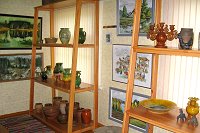 There is no need to go to the Mediterranean to see the rich cultural heritage of Malta. Malta History Museum in Rēzekne district offers unique historical heritage – material and nonmaterial values created by previous generations as well as newly created ones during this age; they are presented in corresponding collections, expositions and during educational events. In the museum one can visit the main exposition "Malta in Crossroads of Events in Historical Photo Moments", two collection exhibitions "Paintings and Pottery by District Artists" and "Household Objects of Malta Parish Inhabitants" presented in a room layout characteristic of 1930s – 1960s. The Malta museum offers tours around Malta and its vicinity. There is no need to go to the Mediterranean to see the rich cultural heritage of Malta. Malta History Museum in Rēzekne district offers unique historical heritage – material and nonmaterial values created by previous generations as well as newly created ones during this age; they are presented in corresponding collections, expositions and during educational events. In the museum one can visit the main exposition "Malta in Crossroads of Events in Historical Photo Moments", two collection exhibitions "Paintings and Pottery by District Artists" and "Household Objects of Malta Parish Inhabitants" presented in a room layout characteristic of 1930s – 1960s. The Malta museum offers tours around Malta and its vicinity.Unique exhibits: a butter export box from the Ulmanis' era, a cheese press, a certificate from 1914, a piano manufactured by K. Schroeder piano company, dairy produce labels from Rozentova manor. Open: Monday to Friday: 8:00-16:00. On Saturdays and Sundays – with prior notification Address: Parka Street 8, Malta, Malta parish, Rēzekne district, Latvia, +371 64621521, +371 29198542, www.maltasmuzejs.lv Preiļi Museum of History and Applied Arts 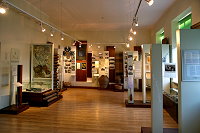 The museum has created its story on Preiļi land and its people in several buildings in the town. When walking the silent streets of Preiļi and visiting any of expositions offered by the museum, you will find out about the ancient history of the district, the dawn of education, cultural, religious, and economic life, you will get to know the heritage left by the great landlords – the Borchs, you will discover the Jewish Preiļi. But the most important – you will feel the locals' pride of their truly outstanding personalities of the district – film director Jānis Streičs, pilot General Jāzeps Baško, philosopher Pēteris Zeilis, archaeologists Antonija Vilcāne and Francis Zagorskis, the Silajāņu pottery old masters Polikarps Čerņavskis, Andrejs Paulāns, Polikarps Vilcāns and many others. Preiļi Museum of History and Applied Arts is the only place outside Riga where the heritage of Jāzeps Pīgoznis (1934-2014) is kept. The content of the museum expositions is smartly supplemented with digital cognitive games, board games, and movement games for visitors of different age groups. The museum offers exciting romantic tours around the Preiļi Park and some rest near a bonfire in the open-air "Sculpture Garden". The museum has created its story on Preiļi land and its people in several buildings in the town. When walking the silent streets of Preiļi and visiting any of expositions offered by the museum, you will find out about the ancient history of the district, the dawn of education, cultural, religious, and economic life, you will get to know the heritage left by the great landlords – the Borchs, you will discover the Jewish Preiļi. But the most important – you will feel the locals' pride of their truly outstanding personalities of the district – film director Jānis Streičs, pilot General Jāzeps Baško, philosopher Pēteris Zeilis, archaeologists Antonija Vilcāne and Francis Zagorskis, the Silajāņu pottery old masters Polikarps Čerņavskis, Andrejs Paulāns, Polikarps Vilcāns and many others. Preiļi Museum of History and Applied Arts is the only place outside Riga where the heritage of Jāzeps Pīgoznis (1934-2014) is kept. The content of the museum expositions is smartly supplemented with digital cognitive games, board games, and movement games for visitors of different age groups. The museum offers exciting romantic tours around the Preiļi Park and some rest near a bonfire in the open-air "Sculpture Garden".Unique exhibits: A part of the uniform belonging to Jozeph Heinrich Borch (1751-1835), owner of the Preiļi manor and Commander of the Order of Malta (1779-1835), this uniform part was found during archaeological excavations in Preiļi manor burial vault in 2008 and restored at the Restoration Department of the National History Museum of Latvia in 2012. Unique textile (beginning of the 18th century) – a corporal of a wine chalice for the Holy Mass, this corporal was made from the gold-embroidered wedding dress of the Preiļi landlady Jadwiga Elizabeth Borch (b. Plater) that she left to the Preiļi Roman Catholic church in 1703. Dower chest with dower belonging to Tekla Casno (1865-1950) from Jasmuiža, a contemporary of the poet Rainis (1865-1929) Bronze archaeological jewellery set of a rich Latgalian woman from the 11th century; found during archaeological excavations lead by the archaeologist A. Vilcāne at Bučku village, Vārkava district; restored in 2013. Silajāņu ceramics (400 pottery units) that is included in the register of the Latvian Culture Canon values as folk traditions – Latgalian pottery. Window edge ornamental decorations of Latgalian houses – woodcarvings Open: Tuesday to Friday: 11:00-18:00, on Saturdays: 10:00-16:00, Sunday till Monday: closed Address: Raiņa Boulevard 28, Preiļi, Latvia +371 6532273, [email protected], www.preili.lv/kultura/muzeji, www.muzeji.lv Polikarps Čerņavskis Pottery House 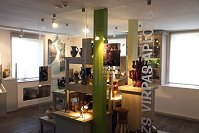 The pottery house of Polikarps Čerņavskis presents an exposition prepared by Preiļi Museum of History and Applied Arts: "Life Made on Potter's Wheel", its common message is a warm-hearted story devoted to the Silajāņu ceramics master Polikarps Čerņavskis (1923-1997). Its content is revealed through originally exhibited museum's collection objects: potter's wheels, tools, and splendid pottery. Visitors are offered an opportunity to try one's hand at making figures from clay on a potter's wheel. Families are offered to enjoy the educational programme "Clay Whistles and Dances" and the board game "Clay Path". You will meet Silajāņu ceramics masters and followers of Polikarps Černavskis' traditions in the third generation already. The pottery house of Polikarps Čerņavskis presents an exposition prepared by Preiļi Museum of History and Applied Arts: "Life Made on Potter's Wheel", its common message is a warm-hearted story devoted to the Silajāņu ceramics master Polikarps Čerņavskis (1923-1997). Its content is revealed through originally exhibited museum's collection objects: potter's wheels, tools, and splendid pottery. Visitors are offered an opportunity to try one's hand at making figures from clay on a potter's wheel. Families are offered to enjoy the educational programme "Clay Whistles and Dances" and the board game "Clay Path". You will meet Silajāņu ceramics masters and followers of Polikarps Černavskis' traditions in the third generation already.Address: Talsu Street 21, Preiļi, Latvia, +371 29429630, +371 65322731 Vārkava Museum of Local Lore 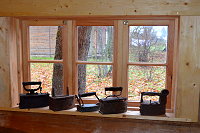 Vārkava parish is usually mentioned as the birth place of the first folk school in Latgale. The gathered objects and information has become the grounds for the first exposition of the museum "The First Folk School in Latgale". It tells the history of the school from the times of the first Independence till nowadays. Vārkava Museum of Local Lore offers its guests to visit the exposition "Vārkava Parish through Centuries" – it shows the history, culture, education and development of the Vārkava parish. The tradition room presents works by Vārkava parish needlewomen and craftsmen. When visiting the tradition room, one can sit at a loom and try to weave, as well as learn other handicraft. The local history museum – granary offers "Exposition of Ancient Household Objects and Tools" in its exposition hall. The salon of creative arts offers to delve into the world of poetry, music, and art of the Vārkava parish. Vārkava parish is usually mentioned as the birth place of the first folk school in Latgale. The gathered objects and information has become the grounds for the first exposition of the museum "The First Folk School in Latgale". It tells the history of the school from the times of the first Independence till nowadays. Vārkava Museum of Local Lore offers its guests to visit the exposition "Vārkava Parish through Centuries" – it shows the history, culture, education and development of the Vārkava parish. The tradition room presents works by Vārkava parish needlewomen and craftsmen. When visiting the tradition room, one can sit at a loom and try to weave, as well as learn other handicraft. The local history museum – granary offers "Exposition of Ancient Household Objects and Tools" in its exposition hall. The salon of creative arts offers to delve into the world of poetry, music, and art of the Vārkava parish. Unique exhibits: woven towels (late 19th – early 20th centuries), ancient handicraft, a loom, a gramophone that is still functional. Open: Monday to Friday: 8:00-16:00, on Saturdays and Sundays: with prior notification Address: Kovaļevsku Street 6, Vārkava, Vārkava parish, Vārkava district, Latvia +371 27059046, [email protected], www.varkava.lv Naujene Museum of Local Lore 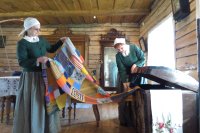 The museum offers to visit the art gallery and open collection of art objects by the Naujene-born sculptress Valentīna Zeile (Paris, France), to feel the nature of the Nature Park "Daugavas loki", the underwater world of the River Daugava in the nature exposition "Daugava's Heart". A collection of ancient household objects and tools can be seen in ethnographic expositions "Room of a Wealthy Peasant" and "Latgalian Household Objects and Tools". The exposition of Daugavpils district history is made of original household and sacral objects from the second half of the 19th century and the 20th century. At the museum everyone can learn about the sacred heritage of Old Believers and Catholics, as well as Polish cultural heritage. In the room of creative workshops, everyone can participate in setting a Guinness record and create the Great Augšdaugava patchwork quilt or to fill the People's memory chest. Children and grown-ups can participate in creative workshops for creation of round rugs, wickerwork, pottery, and pancakes. The museum offers to get acquainted with the local culinary heritage – it organizes various tastings as well as individually designed wedding and birthday programmes. The museum offers to visit the art gallery and open collection of art objects by the Naujene-born sculptress Valentīna Zeile (Paris, France), to feel the nature of the Nature Park "Daugavas loki", the underwater world of the River Daugava in the nature exposition "Daugava's Heart". A collection of ancient household objects and tools can be seen in ethnographic expositions "Room of a Wealthy Peasant" and "Latgalian Household Objects and Tools". The exposition of Daugavpils district history is made of original household and sacral objects from the second half of the 19th century and the 20th century. At the museum everyone can learn about the sacred heritage of Old Believers and Catholics, as well as Polish cultural heritage. In the room of creative workshops, everyone can participate in setting a Guinness record and create the Great Augšdaugava patchwork quilt or to fill the People's memory chest. Children and grown-ups can participate in creative workshops for creation of round rugs, wickerwork, pottery, and pancakes. The museum offers to get acquainted with the local culinary heritage – it organizes various tastings as well as individually designed wedding and birthday programmes. Unique exhibits: Art collection of sculptress Valentīna Zeile: works in bronze, medals and plaquettes, sculptures. The sculpture "Man and Horse" is devoted to Bartabas – founder of the Theatre Zingaro, Clément Marty, in the Paris suburb Aubervilliers. In its turn, the sculpture "Skater" has gained notice not only in Latvia – one of its copies can be found in a gallery in Athens (Greece). Open: October – April: Monday to Friday: 8:00-17:00; May – September: Monday to Friday: 8:00-18:00, on Saturdays: 10:00-18:00 Address: Skolas Street 1b, Naujene, Naujene parish, Daugavpils district, Latvia +371 65471321, +371 29468988, +371 26532508, [email protected], www.facebook.com/Naujenesmuzejs, www.naujenesmuzejs.lv, www.visitdaugavpils.lv Slutišķi Old Believers' House 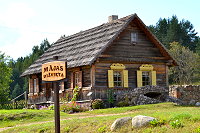 The River Daugava and its valley hide the Slutišķi Old Believers' village from curious eyes of strangers. It is mysterious and obscure. The time has stopped its course here some 100 years ago. Bird voices of "Daugavas loki" are seducing and inviting to the marvellous world of nature sounds, splendid window ornaments tell about outstanding masters of the craft. Every visitor of the village is invited to participate and set the Guinness record – create the Great Augšdaugava patchwork quilt. Unhurried travellers can learn how to crochet round rag rugs, see wickerwork demonstration and feel the lure of Latgale's clay while creating their first clay figures. The Slutišķi Old Believers' village does not open its doors and secrets to everyone, so a prior notification on the visit is requested! The River Daugava and its valley hide the Slutišķi Old Believers' village from curious eyes of strangers. It is mysterious and obscure. The time has stopped its course here some 100 years ago. Bird voices of "Daugavas loki" are seducing and inviting to the marvellous world of nature sounds, splendid window ornaments tell about outstanding masters of the craft. Every visitor of the village is invited to participate and set the Guinness record – create the Great Augšdaugava patchwork quilt. Unhurried travellers can learn how to crochet round rag rugs, see wickerwork demonstration and feel the lure of Latgale's clay while creating their first clay figures. The Slutišķi Old Believers' village does not open its doors and secrets to everyone, so a prior notification on the visit is requested!Address: Slutišķi, Naujene parish, Daugavpils district, Latvia +371 65471321, +371 29468988, +371 26532508, [email protected], www.facebook.com/Naujenesmuzejs, www.naujenesmuzejs.lv, www.visitdaugavpils.lv Polotsk National Historical and Cultural Museum-Reserve 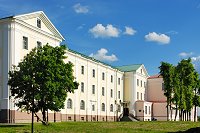 The Museum-Reserve is a unique area where its monuments are being preserved, studied, restored and adapted for museum expositions. Some of the architectural monuments house the museums' expositions: the Sophia Cathedral (mid 11th – mid 18th centuries), one of the buildings of the former Jesuit collegium (18th century), Lutheran church (1888), Brethren School (18th century), houses in Voikova Street 1 and Nizhne-Pokrovskaya Street 46 (19th – beginning of the 20th centuries), Peter the Great House (1692), and the Water Tower (1956). Altogether, the Reserve includes 11 Polotsk museums. All immovable architectural and archaeological monuments together with movable monuments (museum funds store over 90 000 items) are included in the museum collection of the Polotsk National Historical and Cultural Museum-Reserve. The Museum-Reserve with its zone of preservation and museums is the core that turns the historical Polotsk into a museum town. The Museum-Reserve is a unique area where its monuments are being preserved, studied, restored and adapted for museum expositions. Some of the architectural monuments house the museums' expositions: the Sophia Cathedral (mid 11th – mid 18th centuries), one of the buildings of the former Jesuit collegium (18th century), Lutheran church (1888), Brethren School (18th century), houses in Voikova Street 1 and Nizhne-Pokrovskaya Street 46 (19th – beginning of the 20th centuries), Peter the Great House (1692), and the Water Tower (1956). Altogether, the Reserve includes 11 Polotsk museums. All immovable architectural and archaeological monuments together with movable monuments (museum funds store over 90 000 items) are included in the museum collection of the Polotsk National Historical and Cultural Museum-Reserve. The Museum-Reserve with its zone of preservation and museums is the core that turns the historical Polotsk into a museum town. Address: Nizhne-Pokrovskaya Street 22, Polotsk, Vitebsk region, Belarus +375 214422201, www.polotsk.museum.by Museum of the History of Architecture of St. Sophia Cathedral 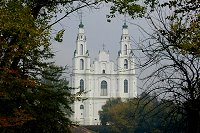 The museum exposition is arranged in St. Sophia Cathedral, a monument of architecture of the 11th – 18th centuries. It tells us about the oldest stone building in the territory of the present-day Belarus, about numerous reconstructions and the latest restoration of the monument. A concert hall of organ music and chamber music is also operating at St. Sophia Cathedral. The museum exposition is arranged in St. Sophia Cathedral, a monument of architecture of the 11th – 18th centuries. It tells us about the oldest stone building in the territory of the present-day Belarus, about numerous reconstructions and the latest restoration of the monument. A concert hall of organ music and chamber music is also operating at St. Sophia Cathedral.Open: September - May: Tuesday till Sunday: 10:00-17:00; June - August: Tuesday till Sunday: 10:00-18:00 Address: Zamkovaya Street 1, Polotsk, Vitebsk region, Belarus +375 214425340, www.sophia.polotsk.museum.by Museum of the Belarusian Book-Printing 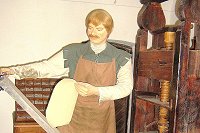 The only book-printing museum in Belarus opened its doors to visitors during the celebration of the 500th anniversary of the Belarusian and Eastern Slavic book-printer Francysk Skoryna. It is located in the former residential building of the Epiphany monastery, an architectural monument of the 18th century. The museum is devoted to the book in all its aspects, from ancient manuscript scrolls to contemporary books. The feeling of the past is created with a workshop of book-copying and a representation of the 17th century printing house. The only book-printing museum in Belarus opened its doors to visitors during the celebration of the 500th anniversary of the Belarusian and Eastern Slavic book-printer Francysk Skoryna. It is located in the former residential building of the Epiphany monastery, an architectural monument of the 18th century. The museum is devoted to the book in all its aspects, from ancient manuscript scrolls to contemporary books. The feeling of the past is created with a workshop of book-copying and a representation of the 17th century printing house. Open: September - May: Tuesday till Sunday: 10:00-17:00; June - August: Tuesday till Sunday: 10:00-18:00 Address: Nizhne-Pokrovskaya Street 22, Polotsk, Vitebsk region, Belarus +375 214425725, www.book.polotsk.museum.by Museum-Library of Simeon of Polotsk 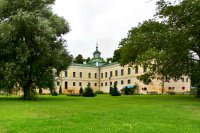 The museum interior is created in the traditional manner of a West-European library of the 17th – 18th centuries. Its exposition tells about Simeon of Polotsk, known as a poet, writer, playwright, translator, teacher and member of clergy. The museum interior is created in the traditional manner of a West-European library of the 17th – 18th centuries. Its exposition tells about Simeon of Polotsk, known as a poet, writer, playwright, translator, teacher and member of clergy. Open: September - May: Tuesday till Sunday: 10:00-17:00; June - August: Tuesday till Sunday: 10:00-18:00 Address: Nizhne-Pokrovskaya Street 22, Polotsk, Vitebsk region, Belarus +375 214425725, www.simeon.polotsk.museum.by Museum of Local Lore 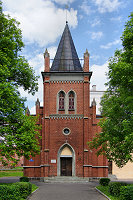 The exhibits of the oldest museum in Polotsk tell about political and economical history of the town, its culture from ancient times till 1941. The museum is situated in the former Lutheran church that is a 19th century architectural monument. The exhibits of the oldest museum in Polotsk tell about political and economical history of the town, its culture from ancient times till 1941. The museum is situated in the former Lutheran church that is a 19th century architectural monument. Open: September - May: Tuesday till Sunday: 10:00-17:00; June - August: Tuesday till Sunday: 10:00-18:00 Address: Nizhne-Pokrovskaya Street 22, Polotsk, Vitebsk region, Belarus +375 214422715, www.local.polotsk.museum.by Nature and Ecology Museum 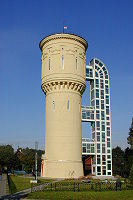 The exposition of the museum occupies the building of the former water tower. When visiting the museum, it is possible to perceive the nature as value and part of human existence, perceive people as part of the nature. The museum expositions not only provide information on the great diversity of flora and fauna, but also show interaction of man and nature. The exposition of the museum occupies the building of the former water tower. When visiting the museum, it is possible to perceive the nature as value and part of human existence, perceive people as part of the nature. The museum expositions not only provide information on the great diversity of flora and fauna, but also show interaction of man and nature. Open: September - May: Tuesday till Sunday: 10:00-17:00; June - August: Tuesday till Sunday: 10:00-18:00 Address: F. Skorina Street 21, Polotsk, Vitebsk region, Belarus +375 214424213, www.ecology.polotsk.museum.by Museum of Traditional Manual Weaving of Poozerye (Lake Land) 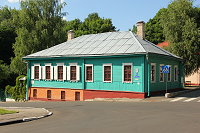 The traditions of manual weaving of Belarusian Poozerye (Polotsk, Verkhnedvinsk, Glubokoye, Dokshitsy, Miory, Postavy, and Sharkovshchina districts) – the cultural and historical heritage are shown in the exposition of the museum. The ornaments of textiles and embroideries are used by the museum to represent the richness and diversity of the cultural and historical heritage. The museum reveals secrets of flax cultivation and processing (end of the 19th – beginning of the 20th centuries). The traditions of manual weaving of Belarusian Poozerye (Polotsk, Verkhnedvinsk, Glubokoye, Dokshitsy, Miory, Postavy, and Sharkovshchina districts) – the cultural and historical heritage are shown in the exposition of the museum. The ornaments of textiles and embroideries are used by the museum to represent the richness and diversity of the cultural and historical heritage. The museum reveals secrets of flax cultivation and processing (end of the 19th – beginning of the 20th centuries). Open: September - May: Tuesday till Sunday: 10:00-17:00; June - August: Tuesday till Sunday: 10:00-18:00 Address: Voikova Street 1, Polotsk, Vitebsk region, Belarus +375 214423041, www.tkach.polotsk.museum.by Children's Museum 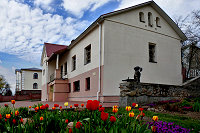 The Children's Museum – it is a kind of a time machine that offers to travel to the world of familiar things, return to the past and try to open the curtain of the future, though it is possible only in one's imagination. The Children's Museum – it is a kind of a time machine that offers to travel to the world of familiar things, return to the past and try to open the curtain of the future, though it is possible only in one's imagination. Open: September - May: Tuesday till Sunday: 10:00-17:00; June - August: Tuesday till Sunday: 10:00-18:00 Address: Nizhne-Pokrovskaya Street 46, Polotsk, Vitebsk region, Belarus +375 214424558, www.children.polotsk.museum.by Art Gallery 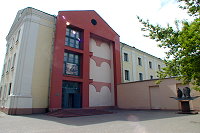 The Art Gallery is housed in one of the buildings of the former Jesuit collegium. The permanent exposition consists of three sections: "Mural Paintings of the 12th – 19th Centuries of the Holy Saviour Orthodox Church of St. Efrosiniya Female Monastery", "Cult Art of the 12th – 19th Centuries", "20th Century Belarusian Art". Exhibition halls host exhibitions of Belarusian and foreign artists. The Art Gallery is housed in one of the buildings of the former Jesuit collegium. The permanent exposition consists of three sections: "Mural Paintings of the 12th – 19th Centuries of the Holy Saviour Orthodox Church of St. Efrosiniya Female Monastery", "Cult Art of the 12th – 19th Centuries", "20th Century Belarusian Art". Exhibition halls host exhibitions of Belarusian and foreign artists. Open: September - May: Tuesday till Sunday: 10:00-17:00; June - August: Tuesday till Sunday: 10:00-18:00 Address: Streletskaya Street 4А-4, Polotsk, Vitebsk region, Belarus +375 214424135, www.gallery.polotsk.museum.by Stationary Exhibition "A Walk along Nizhne-Pokrovskaya Street" 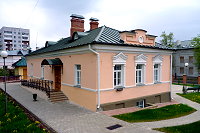 This is the first exposition in Belarus devoted to the history of one particular street during particular period of time. It is created on the basis of "The Guidebook on Polotsk" (1910) and tells the history of the street, people who used to live and work here, as well as buildings and institutions on this street at the beginning of the 20th century. This is the first exposition in Belarus devoted to the history of one particular street during particular period of time. It is created on the basis of "The Guidebook on Polotsk" (1910) and tells the history of the street, people who used to live and work here, as well as buildings and institutions on this street at the beginning of the 20th century. Open: September - May: Tuesday till Sunday: 10:00-17:00; June - August: Tuesday till Sunday: 10:00-18:00 Address: Nizhne-Pokrovskaya Street 46, Polotsk, Vitebsk region, Belarus +375 214 458116, www.walk.polotsk.museum.by Museum of Wartime Fame 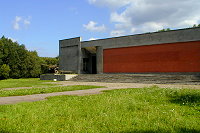 The museum exposition presents the history of Polotsk defence in June 1941, the life of the town and district during the German fascist occupation period, underground organizations and partisan movements, as well as the participation of Polotsk inhabitants in the most significant battles of the Second World War. The museum exposition presents the history of Polotsk defence in June 1941, the life of the town and district during the German fascist occupation period, underground organizations and partisan movements, as well as the participation of Polotsk inhabitants in the most significant battles of the Second World War. Open: September - May: Tuesday till Sunday: 10:00-17:00; June - August: Tuesday till Sunday: 10:00-18:00 Address: Tusnolobova-Martchenko Street 1, Polotsk, Vitebsk region, Belarus +375 214434421, www.war.polotsk.museum.by Museum-Apartment of the Hero of the Soviet Union Z. Tusnolobova-Marchenko 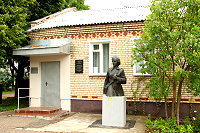 The exposition of the memorial museum is located in one room of the dwelling house where the Honorary Citizen of Polotsk and manly nurse Z. Tusnolobova-Marchenko, who has saved lives of many soldiers and officers during the Second World War, has spent last years of her life. Here one can see the exhibit – the medal of the International Red Cross organisation that is presented to nurses for loyalty to their work and for courage when helping the wounded and the sick during war and peace time. The exposition of the memorial museum is located in one room of the dwelling house where the Honorary Citizen of Polotsk and manly nurse Z. Tusnolobova-Marchenko, who has saved lives of many soldiers and officers during the Second World War, has spent last years of her life. Here one can see the exhibit – the medal of the International Red Cross organisation that is presented to nurses for loyalty to their work and for courage when helping the wounded and the sick during war and peace time. Open: September - May: Tuesday till Sunday: 10:00-17:00; June - August: Tuesday till Sunday: 10:00-18:00 Address: 23rd Gvardzeytsev Street 1, Polotsk, Vitebsk region, Belarus +375 214439469, www.tusnolobova.polotsk.museum.by Daugavpils Regional and Art Museum 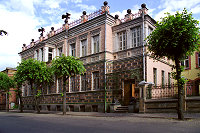 It is one of the oldest and largest museums in Latgale. The museum was founded in 1938. It is situated in one of the most beautiful buildings of the town – an art nouveau building that was built in 1883 and that is a cultural and historical monument of architecture. The mission of the Daugavpils Regional and Art Museum is to collect, keep, examine and popularise cultural and historic, art and natural collections of Daugavpils district; to facilitate the exploration of cultural and historic heritage and modern experience; to motivate society's interest and understanding of historical processes in the Daugavpils district, and to create respect to their own mental heritage and ancestral customs in the society. It is one of the oldest and largest museums in Latgale. The museum was founded in 1938. It is situated in one of the most beautiful buildings of the town – an art nouveau building that was built in 1883 and that is a cultural and historical monument of architecture. The mission of the Daugavpils Regional and Art Museum is to collect, keep, examine and popularise cultural and historic, art and natural collections of Daugavpils district; to facilitate the exploration of cultural and historic heritage and modern experience; to motivate society's interest and understanding of historical processes in the Daugavpils district, and to create respect to their own mental heritage and ancestral customs in the society.Unique exhibits: Model of the 13th century Dinaburga castle Burial of a man from 10th – 13th centuries; found in 1983 in Kalkūni, Daugavpils district Archaeological findings from Jersika burial field of the 12th century Lock and key from the Mikhail Gate of Dinaburga Fortress Polyphone – a musical instrument from the 2nd half of the 19th century Hackney carriage of the beginning of the 20th century Memorial plate dedicated to the opening of the Unity Bridge National costume of a participant of the Latgale Song Festival of 1940 Household objects and personal belongings of politically repressed people Living-room interior of the end of the 19th century with art nouveau elements Unique icons of the 16th century "St. Nicolas the Wonderworker" and "St. John the Baptist" Open: on Mondays: 10:00-16:00, Tuesday to Saturday: 10:00-18:00, on Sundays: 10:00-16:00 Address: Rīgas Street 8, Daugavpils, Latvia +371 65424155, www.dnmm.lv, [email protected] Daugavpils Clay Art Centre 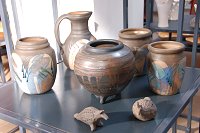 In Daugavpils Clay Art Centre ceramists have received the opportunity for creative work with clay – modeling, turning, glazing and firing – in new studios with modern equipment. Up-to-date exhibition halls and summer activity hall are hosting various art exhibitions, seminars and other culture and art events. The Centre organizes classes for children and master classes for the public offered by professional ceramists. During these master classes city guests try to make clay pottery or other clay objects while getting practical knowledge on Latgalian ceramics and course of pottery work. Alongside with that it is possible to fire both the smoke-fired pottery and the classical glazed Latgalian pottery in a wood-fired kiln. The Centre has an improved yard where activities of a clay festival as well as folk music concerts are organized. Employees of Daugavpils Clay Art Centre and ceramists of the National Studio of Applied Arts "Latgale" situated in this Centre are uninterruptedly taking care to implement one of the most significant missions of the Centre – to popularize, preserve and strengthen Latgale pottery traditions and clay art. Besides that, the Centre is the only place in Latvia where to learn about the hardened Baltic raku ceramics. In Daugavpils Clay Art Centre ceramists have received the opportunity for creative work with clay – modeling, turning, glazing and firing – in new studios with modern equipment. Up-to-date exhibition halls and summer activity hall are hosting various art exhibitions, seminars and other culture and art events. The Centre organizes classes for children and master classes for the public offered by professional ceramists. During these master classes city guests try to make clay pottery or other clay objects while getting practical knowledge on Latgalian ceramics and course of pottery work. Alongside with that it is possible to fire both the smoke-fired pottery and the classical glazed Latgalian pottery in a wood-fired kiln. The Centre has an improved yard where activities of a clay festival as well as folk music concerts are organized. Employees of Daugavpils Clay Art Centre and ceramists of the National Studio of Applied Arts "Latgale" situated in this Centre are uninterruptedly taking care to implement one of the most significant missions of the Centre – to popularize, preserve and strengthen Latgale pottery traditions and clay art. Besides that, the Centre is the only place in Latvia where to learn about the hardened Baltic raku ceramics.Open: Tuesday to Saturday: 12:00-18:00, on Sundays: 12:00-16:00, Monday to Tuesday: closed Address: 18.novembra Street 8, Daugavpils, Latvia +371 65425302, +371 29241488, www.dnmm.lv, [email protected] Utena Museum of Local Lore 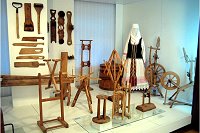 Utena Museum of Local Lore was founded in 1929 by the school teacher, researcher of local lore and interpreter Antanas Namikas. The museum funds present more than 72 000 exhibits. Museum expositions throw modern light on Utena district history, ethnography and traditional crafts. While learning about the growth of Utena since the moment of its foundation, we see what is attractive, different and interesting in the town. Utena Museum of Local Lore was founded in 1929 by the school teacher, researcher of local lore and interpreter Antanas Namikas. The museum funds present more than 72 000 exhibits. Museum expositions throw modern light on Utena district history, ethnography and traditional crafts. While learning about the growth of Utena since the moment of its foundation, we see what is attractive, different and interesting in the town. Open: Tuesday to Friday: 10:00-18:00, on Saturdays: 10:00-17:00 Address: Utenio Street 3, Utena, Lithuania +370 38961637, +370 38961634, [email protected], www.utenosmuziejus.lt Branches of Utena Museum of Local Lore Centre of Traditional Crafts "Svirnas" (Granary) 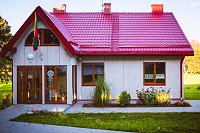 Since 2013, the centre of traditional crafts "Svirnas" (Granary) offers an opportunity to learn about traditional crafts of the Lithuanian people to town inhabitants and its guests. Certified masters are teaching their crafts: paper cutting, egg dyeing, weaving, knitting, hair braiding and fastening skills. The centre unites certified artisans of the Utena district, studies and promotes development of the national heritage and national cultural customs, organizes culture and educational events. Open: Monday to Friday: 08:00-17:00, on Fridays: 08:00-15:45 Address: K. Ladigos Street 18, Utena, Lithuania +370 61525062, [email protected], www.utenosmuziejus.lt Museum of the War of Liberation 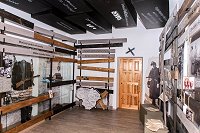 The new and modern Museum of the War of Liberation is opening in 2015. The museum exposition tells about one corner of the country; still, in this light it is possible to learn not only the past of Lithuania, but also that of other European countries. The exposition is prepared on the basis of principles of historical contrasts by revealing the most significant events of 1940 – 1965 in Utena district, Lithuania, and comparing them from time to time with the life behind the "steel curtain". Knowledge on differences between Eastern European and Western European history allows nations to learn more about each other and brings them closer. The new and modern Museum of the War of Liberation is opening in 2015. The museum exposition tells about one corner of the country; still, in this light it is possible to learn not only the past of Lithuania, but also that of other European countries. The exposition is prepared on the basis of principles of historical contrasts by revealing the most significant events of 1940 – 1965 in Utena district, Lithuania, and comparing them from time to time with the life behind the "steel curtain". Knowledge on differences between Eastern European and Western European history allows nations to learn more about each other and brings them closer. Address: Stoties Street 39, Utena, Lithuania Literary-Ethnographic Farmstead of Brothers A. Miškinis and M. Miškinis in Juknenu village 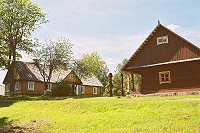 The authentic ethnographic farmstead of brothers A. and M. Miškinis keeps the memories on the poet, exile time bard Antanas Miškinis, and the translator and literary researcher Motiejus Miškinis, as well as their brother Vincas Miškinis. Thus the museum visitors have an opportunity to grasp the spirit of the Aukštaitija district: in poetry, in an ethnographic farmstead, and from behind a desk of the secret 19th century school. The authentic ethnographic farmstead of brothers A. and M. Miškinis keeps the memories on the poet, exile time bard Antanas Miškinis, and the translator and literary researcher Motiejus Miškinis, as well as their brother Vincas Miškinis. Thus the museum visitors have an opportunity to grasp the spirit of the Aukštaitija district: in poetry, in an ethnographic farmstead, and from behind a desk of the secret 19th century school. Open: Tuesday to Saturday: 11:00-19:00 Address: Juknenai, Utena region, Lithuania +370 61142148, [email protected], www.utenosmuziejus.lt Tauragnai District Museum 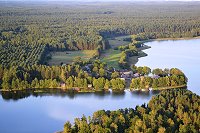 The museum is situated near the deepest lake in Lithuania, Tauragnai, close to the border of the Aukštaitija National Park. It lies close to the one of the most spectacular castle mounds in Utena district – the Taurapilio castle mound. The museum offers an opportunity to learn about courageous, hardworking and creative people known across the whole country of Lithuania. Here you can learn to live according to the advice given by the doctor Eugenija Šimkūnaitė. You will learn about the beauty of Tauragnai surroundings through cognitive tours and will be willing to return once more. The museum is situated near the deepest lake in Lithuania, Tauragnai, close to the border of the Aukštaitija National Park. It lies close to the one of the most spectacular castle mounds in Utena district – the Taurapilio castle mound. The museum offers an opportunity to learn about courageous, hardworking and creative people known across the whole country of Lithuania. Here you can learn to live according to the advice given by the doctor Eugenija Šimkūnaitė. You will learn about the beauty of Tauragnai surroundings through cognitive tours and will be willing to return once more.Open: Tuesday to Saturday: 11:00–15:00 Address: A. Musteikio Street 29, Tauragnai, Utena region, Lithuania, +370 38975037, www.utenosmuziejus.lt Vytautas Valiušis Ceramics Museum in Leliūnai 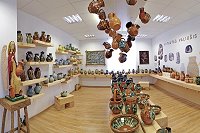 Vytautas Valiušis Ceramics Museum is very unusual. When creating the museum in 2010, ceramist Vytautas Valiušis presented the gathered collection to the society. Modern exhibition halls that were renovated in 2011 are hosting great numbers of traditional pottery, various ethnographic objects, tools and works by the very king of ceramics Vytautas Valiušis. Visitors can not only see the ancient traditional Lithuanian ceramics, but also participate in its creative creation process. The museum has established a ceramics learning master class, an exhibition hall, a conference centre, and a gift shop. Vytautas Valiušis Ceramics Museum is very unusual. When creating the museum in 2010, ceramist Vytautas Valiušis presented the gathered collection to the society. Modern exhibition halls that were renovated in 2011 are hosting great numbers of traditional pottery, various ethnographic objects, tools and works by the very king of ceramics Vytautas Valiušis. Visitors can not only see the ancient traditional Lithuanian ceramics, but also participate in its creative creation process. The museum has established a ceramics learning master class, an exhibition hall, a conference centre, and a gift shop. Open: Tuesday to Friday: 09:00-18:00, on Saturdays: 09:00-17.00 Address: Topolių Street 7, Leliūnai, Utena region, Lithuania +370 68622807, +370 61549525, [email protected], www.utenosmuziejus.lt Art Centre 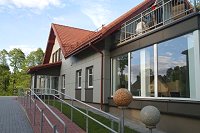 Utena Art Centre was established in 2013 in Leliūnai of Utena region within the framework of the Latvia-Lithuania cross-border project. The Art Centre unites professional modern artists working in the region, supports their creative work and cooperation, as well as presents topical art works and innovative cultural trends. The aesthetic environment of the Art Centre provides an opportunity to see works by artists from Utena region, from Lithuania and from abroad, to participate in art and art therapy workshops, to enjoy concerts of classical and modern music. Utena Art Centre was established in 2013 in Leliūnai of Utena region within the framework of the Latvia-Lithuania cross-border project. The Art Centre unites professional modern artists working in the region, supports their creative work and cooperation, as well as presents topical art works and innovative cultural trends. The aesthetic environment of the Art Centre provides an opportunity to see works by artists from Utena region, from Lithuania and from abroad, to participate in art and art therapy workshops, to enjoy concerts of classical and modern music. Open: Monday to Thursday: 08:00-17:00, on Fridays: 09:00-15:45 Address: Topolių Street 5, Leliūnai, Utena region, Lithuania +370 68579652, [email protected], www.utenosmuziejus.lt |
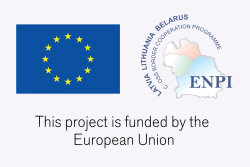 |
| Latgale Planning Region in cooperation with its partners – Latgale Region Development Agency, Polotsk City Executive Committee (Belarus) and Local Lore Museum of Utena (Lithuania), implements the project "Museum Gateway" (No. LLB-2-208). The total budget of the project is 1 428 494.77 EUR. The support of the Latvia, Lithuania and Belarus Cross Border Cooperation Programme within the European Neighbourhood and Partnership Instrument amounts to 1 285 645,27 EUR or 90% of this sum. The overall objective of the project is to promote cultural heritage in cross-border area of Latvia, Lithuania and Belarus. A new cross-border tourism product named: tourism route "Open Museum Gate!" has been developed within the framework of the project. The contents of this material are the sole responsibility of the Latgale Planning Region and can in no way be taken to reflect the views of the European Union. |
|